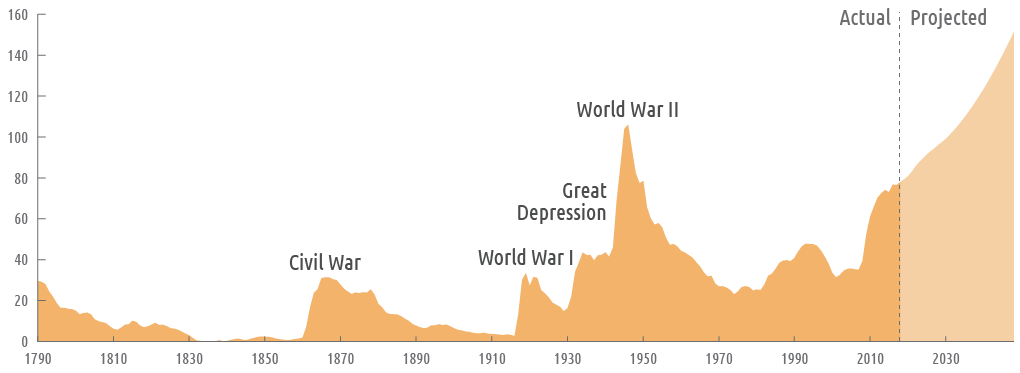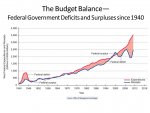- Joined
- Sep 28, 2011
- Messages
- 15,161
- Reaction score
- 11,404
- Location
- SF Bay Area
- Gender
- Male
- Political Leaning
- Conservative
If you understood federal finance, you would know that the government does not borrow from the public. The government simply creates liabilities and spends them into the economy. No private sector assets are borrowed, or even tied up, when the government deficit spends. Treasury issues bonds, public buys bonds, treasury spends the proceeds right back into the economy. The net result is simply an increase in bonds held by the private sector as assets.
After the war, the U.S. government did NOT run balanced budgets. In fact, they continued to deficit spend, albeit at a much slower pace. There was a short recession; most economists expected a depression. There was no paying down of the national debt, either. There never is. So it seems that you are pulling your data straight out of your backside.
I am not sure there is much benefit in dialog with someone utters claptrap that if said by a fellow student my Econ 101 classroom, I'd think he/she was the class idiot. Your rejoinder is so painfully moronic it makes me wonder if you are a uneducated troll (and a bad one at that.). Yes, massive borrowing from the public by tapping their savings WAS the primary of the two major sources of WWII funding, the other being raising taxes ("the Victory Tax").
How did America pay for World War II? - Marginal REVOLUTION
...savings, which was the War's primary source of funding. During the War, Americans purchased approximately $186 billion worth of war bonds, accounting for nearly three quarters of total federal spending from 1941-1945. Today, we don't have the savings to pay for our current spending, let alone any significant expansions. Even if we could convince the Chinese to loan us a large chunk of the $20 trillion (on top of the $1 trillion we already owe them), how could we ever pay them back?
Moreover, yes the government essentially had balanced budget since WWII until 1974, at which point the WWII debt had declined in size from 120% to 30% of the annual budget (Reagan was the last President to have paid off WWII debt).


So yes, the economic conditions prior and during WWII were vastly different in that they had underutilized capital, used funding by massive borrowing from the public in the form of war bonds made possible by deferring current consumer income to extreme domestic rationing and the necessary privation on behalf of arms production and employment of soldiers. And once the war was over, and after a sharp recession, the US government had essentially balanced budgets and slowly paid down debt owed to the public...ending the payback decades after the war was over. All of which made more manageable in that the US was the only great manufacturing economy left unscathed by the war's destruction.
Wrong again friend. Had you read the results and findings of the paper AFTER the data error was corrected, you'd know the results are essentially the same. In other words, whatever the criticism of the error made in original computations, upon correction the findings proved robust. As such, there was no retraction or need to withdraw the paper. Your hope that it was somehow debunked is rooted in uninformed hope, which by now is not surprising.That 90% threshold is a fairy tale, borne of bad reasoning and faulty data. Reinhart & Rogoff's paper has since been roundly criticized and thoroughly debunked.
From what you have written, you are the one who needs to learn economics.
LOL...the data and links provided is there for all to ponder - even for those who did not minor in economics (as I did).
Last edited:

